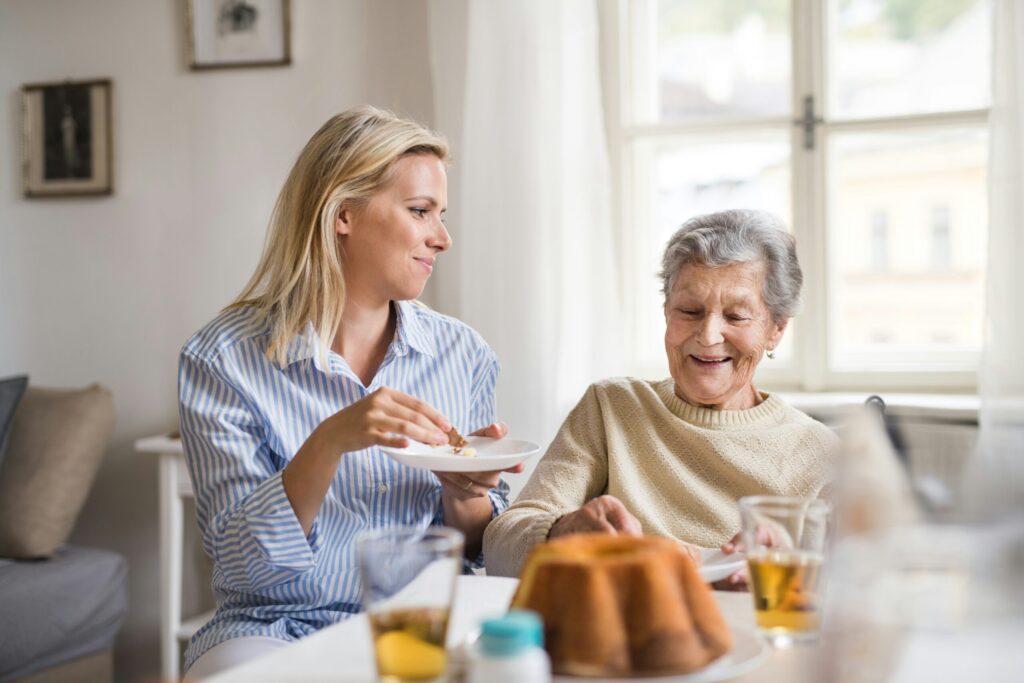Every November, we recognize National Family Caregivers Month—a time to shine the spotlight on the millions of people who step up for their loved ones in ways both big and small. Caregivers are the quiet heroes who manage doctor’s appointments, coordinate medications, provide companionship, and often keep entire households running.
If you’re in your 40s, 50s, or beyond, chances are you either are a caregiver now, have been one, or will be one at some point. For many women in midlife—already navigating perimenopause or menopause—caregiving often becomes another hat to wear. And while it can be meaningful and rewarding, it can also be challenging.
Who We’re Celebrating This Month
National Family Caregivers Month is about honoring the daughters, sisters, partners, friends, and neighbors who step in when someone needs care. According to a recent study, more than 38 million people in the U.S. provide unpaid care to family members, and the majority of them are women.
These women often put their own lives on hold—juggling careers, families, and personal health while making sure their loved ones are safe and supported. This month reminds us that caregivers deserve more than a thank-you. They deserve resources, recognition, and real support.
The Disproportionate Burden on Women
Let’s be honest: caregiving falls heavily on women’s shoulders. Studies show that women are more likely to cut back work hours, shift careers, or even leave jobs entirely to care for parents, partners, or grandchildren. That doesn’t just affect today—it impacts long-term financial security, retirement savings, and mental health.
And it’s not only about logistics. Caregiving can bring feelings of guilt, stress, or exhaustion. Layer that with hot flashes, fatigue, or brain fog from menopause, and it’s easy to feel tired and overwhelmed.
But here’s the thing: you can’t pour from an empty cup. Which is why this month is also about encouraging caregivers—especially women in midlife—to care for themselves, too.
Practical Ways to Protect Your Well-Being
Here are a few simple strategies that can help you stay balanced and practice self-care while caring for others:
- Set realistic boundaries: It’s okay to admit you can’t do everything. Let go of guilt and say “no” when you need to.
- Share the load: Ask siblings, friends, or community members to pitch in. Caregiving should be a team effort, not a solo job.
- Take breaks (without apology): Even short respites—like reading a book, taking a walk, or meeting a friend for coffee—can make a huge difference.
- Keep up with your own health: Don’t skip your check-ups, movement, or rest. Your well-being matters just as much as your loved one’s.
- Find your people: Join a caregiver support group (online or local). Sometimes just talking to someone who “gets it” is the best medicine.
Finding the Bright Spots
IYes, caregiving is hard. But it can also bring unexpected gifts. Many women find that it strengthens bonds, deepens empathy, and helps them rediscover what truly matters.
Whether it’s laughing with a parent over old stories, finding new ways to connect with a partner, or showing grandkids what resilience looks like—you may discover small moments of joy in the midst of challenge.
Resources That Can Help
You don’t have to figure this out alone. There are great organizations ready to support you:
- Family Caregiver Alliance (caregiver.org) – Practical resources and education.
- AARP Caregiving Resource Center (aarp.org/caregiving) – Tools and guidance for family caregivers.
- National Alliance for Caregiving (caregiving.org) – Advocacy and information.
- Eldercare Locator (eldercare.acl.gov) – Connects you with local services in your area.
This National Family Caregivers Month, take a moment to honor yourself—or the caregivers in your life. The role you play is vital. But remember: your well-being matters, too.
Caregiving is not just about giving; it’s also about receiving love, support, and connection. This November, let’s celebrate caregivers not just for what they do, but for who they are: strong, compassionate, and worthy of care themselves.
